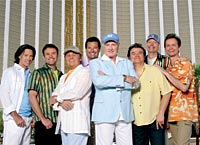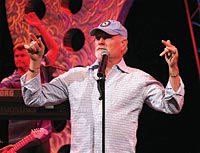“There are so many ways that our music has become part of the fabric of American culture,” declares Mike Love, lead singer of The Beach Boys, in a phone interview with Xpress. There isn’t so much as a hint of hyperbole in his voice.
It’s a staggering statement from any artist, but even more staggering when one realizes that it is, in fact, true. The Beach Boys’ music serves as a sort of soundtrack to the uniquely American experience of surf, summer and hot-rod cars. Founded in 1961, the group created a sophisticated blend of Chuck-Berry rock and jazz-influenced harmonies that somehow transcended mere pop music and created a modern mythology with California as the sun-kissed promised land.

Now, fronted by founding vocalist Mike Love, the touring version of the Beach Boys brings its well-refined act to Canton’s Pisgah Memorial Stadium. Somehow, considering the vision they created nearly a half century ago, the group’s current role in American music doesn’t seem fitting.
But why? What has changed now that that endless summer has given way to a humble, late-career fall?
It’s hard to say, partially because Love can come across as more of a salesman than a singer. Routine questions somehow act as segues into impromptu ads for whatever greatest-hits album he’s pushing at the moment or a chance to talk up the latest inclusion of the band’s music – that he helped create more than 40 years ago – in a film. In fact, he’s so adept at his unsubtle selling of the band that a simple anecdote about the multigenerational appeal of his band turns into yet another plug for his band.
“My daughter came home from school last week, and she told me her fourth grade class’ favorite song was ‘Wouldn’t It Be Nice,’” says Love. “‘Wouldn’t It Be Nice’ was featured in [the movie] 50 First Dates, and recently the animated movie Happy Feet featured a dance number to our song ‘Do It Again.’”
It’s a rare gift to be the consummate salesman as well as, at least in Love’s eyes, the shepherd of the musical legacy of one of the most beloved acts in rock ‘n’ roll history.
“I have a responsibility to the Beach Boys ‘brand,’” explains Love.
While the Beach Boys may still be a popular touring act around the country, the band is certainly not the draw it used to be. While the band’s ‘60s brethren The Rolling Stones are busy playing football stadiums to sold-out crowds, the Beach Boys are appearing at state fairs across the country on their never-ending tour.
“We started touring in a station wagon and a U-Haul in 1962, and fortunately we’re doing a little better now,” jokes Love, though one can’t help but feel the sting in his voice. The Beach Boys were once considered second only to The Beatles, but now they’re seen by some as a traveling oldies act, profiting on the nostalgia of their remaining fans.
“The audience response is amazing,” says Love of their live shows. “It’s amazing to see the response from multiple generations of people.”
While Love is correct that the band, which also features Bruce Johnston (who replaced Brian Wilson as a touring member of the band in 1965), garners rave reviews around the country, the question still remains: Why are the Beach Boys playing Canton?
The answer to that lies in the spirit of urban renewal.

With a hulking, pungent paper mill in the middle of downtown, there has been little to encourage tourism and development in Canton. But where others saw the hollow shell of a ghost town, Canton Mayor Pat Smathers saw a historic downtown ready for reemergence.
“For a town like us, some really significant things have happened,” explains Smathers. “We restored the Colonial Theater; we buried the power lines on Main Street. Look at what Asheville’s done; we can’t do anything like that, but we are coming along.”
Smathers sees the Beach Boys’ visit as another way to put his city back on the map, and to help it shake its decades-long reputation as the foul-smelling town just west of Asheville.
Smathers notes that any money raised from the concert will go right back into the community.
“Enka [High School]‘s booster club will get a third of the profit, Pisgah [High School]‘s booster club will get a third, and Canton’s Cultural Committee will get a third of the profit,” Smathers says.
But why, out of all the available ways to raise Canton’s profile, were the Beach Boys contracted to perform?
“We wanted to get a band that sort of helps change the perception of Canton, and to highlight the changes that Canton’s been going through,” says Smathers. “Let’s be honest, for someone like [the Beach Boys] to play Canton—and don’t get me wrong, I think Canton is Camelot—but you don’t think that Canton could get big-name entertainment.”
Of course, big-name entertainment usually goes hand-in-hand with larger-than-life conflict and drama.
In the long and litigious history of the Beach Boys, people have often contrasted the dueling personalities within the band: the childlike, introverted and troubled genius of Brian Wilson, who’s credited with creating the majority of the music from the Beach Boys’ golden years; and his unabashedly commercial, almost huckster-like cousin Mike Love. It’s as if their roles within the Beach Boys’ unique vocal blend all those years ago predicted the lawsuits and bad feelings that were to come.
But when asked about the perception that he wears the black hat in the seemingly never-ending war over the Beach Boys’ legacy, Love’s tone immediately changes from that of the friendly guy next door to something else – something deeper, that at times borders on contempt. It’s a startling contrast.
“The problem is that Brian and his father, Murray, didn’t credit me with writing ‘California Girls’ and ‘I Get Around’ and a number of the songs back in those days, so the public has a disproportionate view of who created those songs and who wrote those songs,” Love says tersely.
“Brian for years remained silent and took credit for writing those songs, which I actually wrote. There’s no doubt that some of the people, with respect to his PR and management, have contributed to the demonization of Mike Love. But I know what I did, and so does Brian. And Brian tried to rectify it, but he couldn’t because he was in a conservatorship at the time because of his mental issues.”
This is a rather polite way of characterizing Love’s 1992 lawsuit against Wilson – an effort to reclaim lost royalties on many of the Beach Boys’ classic songs. The case was eventually settled out of court.
“Anyways, it’s all been rectified, but it’s still a residual legacy of that conclusion,” Love says.
It’s a topic worthy of further exploration, the central drama to the tale of how the Beach Boys came undone. But before anything else can be asked, the phone is abruptly handed to the band’s publicist, who then announces that the interview is over.
Maybe it’s just as well. Some stories are better left unfinished.
In the end, the Beach Boys’ appearance in Canton can only be described as bittersweet. For the hundreds of fans who show up, a good time will almost certainly be had. They’ll sing along with the songs that defined their youth, and perhaps be reminded of past glories as they look toward Canton’s future.
But for some, the friendly, baseball-cap-wearing emcee that Mike Love has become no longer represents the perfect wave that he sings about or the cutest girls in the world that he longs to see again, but just another hero fading away. It brings to mind the song “Caroline, No” from the band’s classic Pet Sounds album: “Could I ever find in you again/ Things that made me love you so much then/ could we ever bring them back once they have gone?”
[Jason Bugg is a freelance writer based in Asheville.]
The Beach Boys perform at Pisgah Memorial Stadium in Canton on Saturday, Aug. 25, 7 p.m. $25/adults, $10/children under 12. etix.com or 646-3412.



i read the whole article, bugg. where does he call you ‘a snake’?